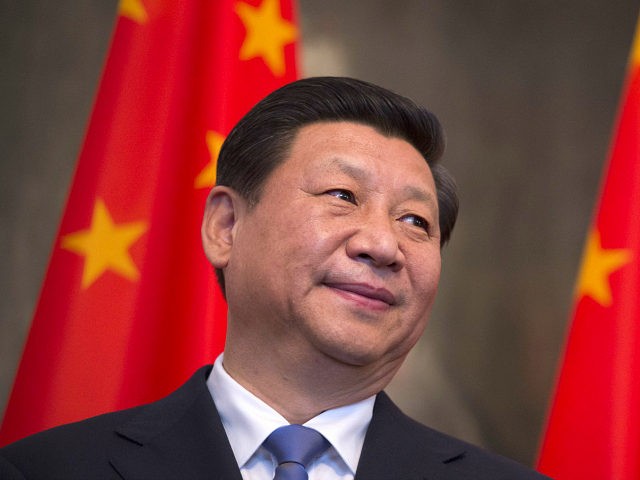Chinese state media urged citizens to work hard to benefit Beijing in celebration of International Workers’ Day, a Marxist holiday, on Tuesday, extensively quoting Communist Party leader Xi Jinping’s assurance that “happiness is achieved through hard work.”
Xi has enshrined his totalitarian communist ideology – “Socialism with Chinese Characteristics for a New Era,” or simply “Xi Jinping Thought” – in the Chinese Constitution and ordered the nation’s education system to put a greater emphasis on Marxist indoctrination. Addressing workers on Monday, Xi argued that “both socialism and the creation of a new era can only be achieved through hard work,” according to state outlet Xinhua.
“Praising workers for their notable contribution to the cause of the Party and state, Xi said that the award and college education they have received can be regarded as an honor for their diligence and selfless devotion,” the outlet noted.
Xi also encouraged Chinese students to read and abide by The Communist Manifesto, the Marx and Engels text urging the destruction of the global middle class. The Chinese must “apply the scientific principles and the spirit of The Communist Manifesto to the overall planning of activities related to the great struggle, great project, great cause, and great dream,” Xi commanded.
China Daily, another government outlet, noted that, on May Day, Marxists throughout China had adopted “happiness is achieved through hard work” as a “buzzword among the Chinese people.”
“Working hard is the most honorable, noblest, greatest and most beautiful virtue,” Xi Jinping recently told students at China University of Labor Relations, according to the newspaper report.
China Daily used the occasion to retell the legend of Xi Jinping, whose “deep connection to the people was formed early in his life” when he moved to a rural area in Shaanxi province to allegedly “learn from farmers.”
Xi is scheduled to honor Karl Marx with a speech delivered Friday at the Great Hall of the People to observe his 200th birthday.
“Xi Jinping Thought” is largely based on textbook Marxist philosophy, modified with Chinese national supremacy. Xi elaborated on his philosophy during a controversial three-hour speech to the Communist Party Congress in October, declaring the time had come for the Han Chinese people “to take centre stage in the world and to make a greater contribution to humankind.”
According to Xi, the Communist Party must lead China to “build on the foundation created by the moderately prosperous society with a further 15 years of hard work” between 2020 and 2035. After 2035, China will develop, through the “hard work” of Marxists, into a “great modern socialist country” and a global superpower, Xi told the Congress.
Following the speech, Xi commanded China’s education authorities to increase the amount of “patriotic” Marxist content in elementary and secondary schools. China’s top education official announced that Xi Jinping Thought would “go into textbooks, into classes, and into the brains” of all Chinese children. The move followed a government campaign against homeschooling, which could shield many children from communist indoctrination.
In April, Xinhua publicized the alleged positive benefits of China’s new “Marxism tour” study abroad program, which sent university students to visit “places where Karl Marx once lived, studied or worked, to coincide with Marx’s 200th birthday.”
“The students held talks with Marxist experts and saw Marx’s manuscripts, notes and book collection during the trip, which started on April 12,” Xinhua reported.
Following his declaration on October, Xi announced in February during his speech commemorating Lunar New Year that China had “taken the great leap from ‘catching up with the times’ to ‘leading the times,'” implying that it had overtaken the United States in global influence.
“We should nurture and practice core socialist values, foster the traditional virtues of the Chinese nation, and love both family and the country,” Xi urged.

COMMENTS
Please let us know if you're having issues with commenting.